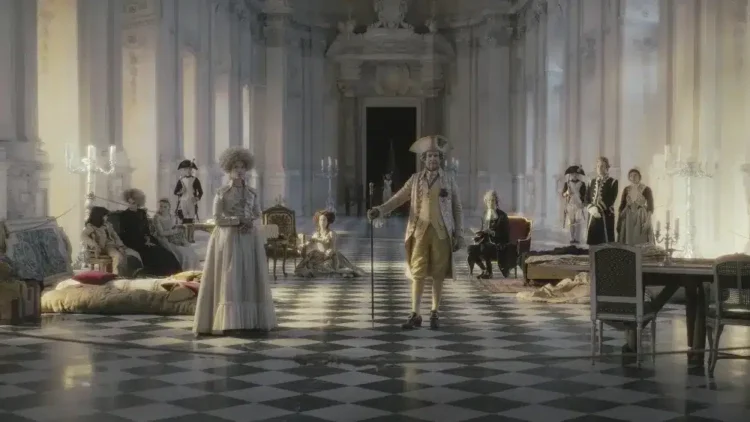




Dir: Gianluca Jodice | Cast: Guillaume Canet, Mélanie Laurent, Aurore Broutin, Hugo Dillon, Tim Hudson, Roxane Duran | Drama
A novel new drama about the French Revolution looks at the human side of suffering from the point of view of the French King Louis XVI and his Austrian wife Marie-Antoinette.
Louis was purported to comment on the aftermath of France and the World in general after his demise with the famous saying: “Après moi, le déluge” (“After me, the flood”). Contrary to legend he comes across as a rather kindly, confused personality and – rather like the Russian Tsar Nicholas – divorced from reality, in this thoughtful portrayal by Guillaume Canet who gives one of the best performances of his career to date as the last king of France in this Italian/French impressionist drama. The final scenes see him gaining gravitas, transformed into an more understanding and philosophical monarch.
The French bourgeoisie had been at pains to eradicate the monarchy and opt for a more modern democracy (which now seems to have run aground two centuries later). And although the young Louis XVII survived in prison after the Reign of Terror, he died, aged 10, due to poor conditions in the Cafe La Tour du Temple several years after his father in 1795. Ironically the king has been, at the time, remodelling the set-up to give a more democratic spin to the way France was being run, and this process has already started with the Declaration of the Rights of Man and of the Citizen in 1789.
Le Deluge is an exquisite-looking reimagining of those final months for the monarchs and their two children. The film, a chamber piece that mostly unfolds in lush and then squallid interiors, opens as the couple arrive elegantly dressed with their staff in tow. Canet is well-disguised with puffy cheeks which make his look rather amiable. Gradually their privileges are removed with a relocated to a sordid couple of rooms, and eventually separated from each other all together. These reduced circumstances are clearly a character forming experience that brings about a process of reflection were the two discuss their failed marriage (which was in part attributed to Louis’ physical deformity) in scenes that are extremely moving, Cannet really bringing out the humanity of the King as he addresses his shortcomings. And we feel for him.
Marie-Antoinette comes cross as a more prickly, unappealing character, intolerant of her situation which she feels is no fault of her own. She rails at the King for his attempts at being upbeat and cheerful in the light of their tragedy (they were not the only ones to die; around 40,000 perished under the guillotine’s blade). The sexual side of the couple’s marriage was clearly a failure. Marie-Antoinette had been forced to seek solace in lovers. When Louis is carted off to the guillotine she becomes histrionic but resigned to look after her remaining family. Meanwhile, the revolutionaries themselves are mostly portrayed as vengeful baddies bent on humiliating the royals. In one scene the Queen offers the main prison guard (Dillon) sexual favours in return for better treatment for her loved ones.
Italian director Gianluca Jodice and his writer Filippo Gravino avoid sensationalism choosing to focus on the human tragedy, the family relationships and the trauma of these final days that would bring about a period of political and societal change in France. @MeredithTaylor
ON GENERAL RELEASE FROM 10 JANUARY 2025